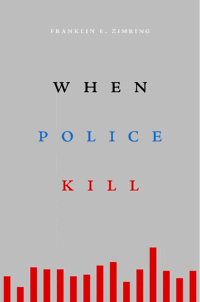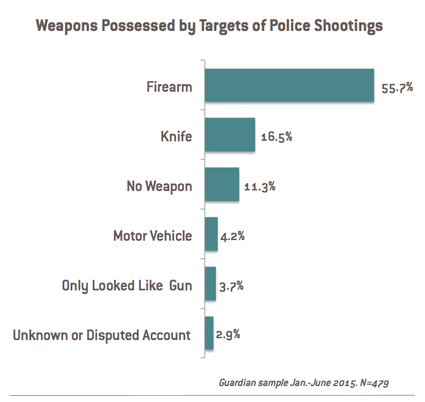
By Susan Gluss
Professor Franklin Zimring’s new book, When Police Kill, reveals an unsettling truth: the number of people shot and killed by U.S. law enforcement is almost double the official estimates.
For decades, government agencies have reported about 500 civilians shot each year during lethal encounters with police. But Zimring’s research exposes the flaws in that accounting. He concludes that police shoot and kill roughly 1,000 people per year, or three every day.

A staunch believer in the need for empirical research to guide policy, Zimring analyzed a swath of U.S. government records and mass media reports. He compared data from the FBI, the Bureau of Justice Statistics and the National Center for Health Statistics, along with a cluster of studies by The Washington Post, The Guardian and FiveThirtyEight.com.
Zimring also examined data from other developed countries and found that the U.S. fares poorly in comparison. In the U.K., no more than three people a year are fatally shot by police—less than 1/100th of the American rate. But the risks to U.S. police remain higher still due to the proliferation of 60 million handguns nationwide. Citizens are less safe here, and so are police.
Based on his findings, Zimring suggests a series of reforms that he says could save hundreds of lives—without jeopardizing officers’ safety. He argues that any changes to policing must start within local law enforcement agencies.
Zimring, the William G. Simon Professor of Law and faculty director of Berkeley Law’s Criminal Justice Studies, is a prolific author. A few recent books include: The City That Became Safe (2011), The Great American Crime Decline (2006) and American Capital Punishment (2003).
The following Q&A is an edited transcript of an interview with Zimring about his newest book.
***
Susan Gluss: What inspired you to write this book?
Franklin Zimring: Police use of lethal force is a tremendously important and completely unstudied topic in the United States. But without empirical data, it’s impossible to make decent policy.
SG: Your research found that police shoot and kill about 1,000 people a year—not counting tasers or deaths in custody. Were you shocked by the high number?
“The handgun is police enemy number one, and there is no police enemy number two.”
Zimring: The jump from 500 to 1,000 was a surprise. I looked at three different federal programs, and, while they had different problems, they were all pretty close to each other in magnitude.
SG: You also say that deaths of police dropped by about 70 percent in the past 40 years, due in part to bullet-proof vests. Civilian deaths dropped too, but only by about nine percent. Why the discrepancy?
Zimring: That’s an important question. Although risks for police are down, the rules for use of lethal force haven’t changed: the circumstances in which police are trained to shoot, and to keep shooting, have stayed relatively fixed.
SG: The book title, “When Police Kill,” is provocative. It implies that police are killing, not protecting.
Zimring: When police use lethal force, they’re seeking what is in effect the death of the adversary. There are pretty good factual indications of that.
I did a study 45 years ago of civilians shooting civilians in Chicago. In more than 85 percent of the cases, the civilian inflicted only a single gunshot wound. Not true with police shootings. Police are taught not only to shoot, but also to continue shooting.
What difference does that make in terms of the death rate? Plenty. If police inflict a single wound, the death rate is 21 percent. Two or three wounds, it’s 34 percent. Four or five wounds, it’s 54 percent. More than five, it’s 72 percent.
The FBI calls these killings “justifiable,” but they never audit the police records, they never find out what the history is. Let’s talk about the term justifiable. Does that mean that when a civilian dies in these circumstances, the world is a better place? Is it sort of a social improvement when police kill? The answer is not unless police or citizen safety is being protected.
SG: Is citizen safety the primary motivator?
Zimring: No. In only 2.7 percent of all the cases of killings in the first six months in the Guardian sample did the police say that protection of another citizen was the motive for the shooting.
 SG: Your book is the first legal empirical analysis of police shootings. Will it have an impact?
SG: Your book is the first legal empirical analysis of police shootings. Will it have an impact?
Zimring: I think it will improve whatever serious conversations take place about policy. I hope that this is true on both sides of this debate, because I think that very serious mistakes are being made by protesters, as well as police unions.
SG: Protestors are demanding criminal prosecution of officers in the wake of high-profile shootings of unarmed black men.
Zimring: All of the emphasis is on criminal prosecution. But felony convictions of police officers for use of lethal force can be counted on the fingers of one hand. Some prosecutions are important, but that’s not going to save hundreds of lives. They’re going to deal with extreme cases, with the Oscar Grant cases.
It’s the administrative rules and financial incentives that can make the big changes that can save lives on American streets. A focus for the reformers has to change.
SG: You compare the U.S. to other developed countries—and found stark differences. Can you give an example?
Zimring: In Germany, police kill between six and nine people a year, or a little less than one in 10 million per year. In the five years that we’ve studied, there were a total of two German police killed. The reason the numbers were so small is that the number of handguns was also small.
That still is the singular threat to a police officer’s life: on the street, driving in a police car, in public; the handgun is police enemy number one, and there is no police enemy number two.
SG: You say that hundreds of civilian lives can be saved each year by changing officers’ rules of engagement. In what circumstances?
Zimring: The unarmed assailant, the knife assailant, the assailant with the baseball bat; the assault where the police officer kills because he’s alone instead of calling for help. You add all of those up and you get close to 500.
If you want to save lives, then you’ve got to deal with the rules of engagement that are set by police administrators in 18,000 different police agencies. But unless it’s the right kind of training with the right kind of rules, it could very well simply freeze bad techniques.
SG: Do you think law enforcement agencies will agree to suggested reforms?
“The rules of use of deadly force are so liberal now and so permissive of police that the people who represent police interests are terrified of any good empirical research.”
Zimring: It’ll be hard. We’ll need some new federal data collection programs, and some new federal fiscal incentives to make it happen. But we could stop a minimum of 500 killings and a maximum of 800 each year.
Now, that’s a huge margin of difference. Why? Because there’s an awful lot we don’t know about the cases where a gun was present. We don’t know what the overlap was between actual threats to police officers’ lives—and other cases that provoked an officer to shoot.
SG: Can you offer an example of what might be done differently?
Zimring: Statistically, we know that when police are alone, they’re much more trigger-happy. Proof: In 37 percent of the “police were alone” cases that we know about, where a killing resulted, the victim was unarmed. That’s at least nine times greater than with two or more police on the scene. That’s a rule of engagement. If you’re alone, unless bullets are whizzing by, withdraw, and call for help.
SG: You call for clear restrictions on when police can shoot.
Zimring: Lethal force does much more damage than other forms of violent response, so it requires special rules. “Don’t shoot” doesn’t mean stop being a police officer, and it doesn’t mean run away from confrontations. What is means is don’t kill.
SG: What’s behind the problematic data collection by federal agencies?
Zimring: Why doesn’t the FBI do more careful auditing and collection of data? I’ll tell you why: The rules of use of deadly force are so liberal now and so permissive that the people who represent police interests are terrified of any good empirical research.
It’s not rocket science, but making police departments and city governments care deeply about citizen safety is a critical governmental reform.